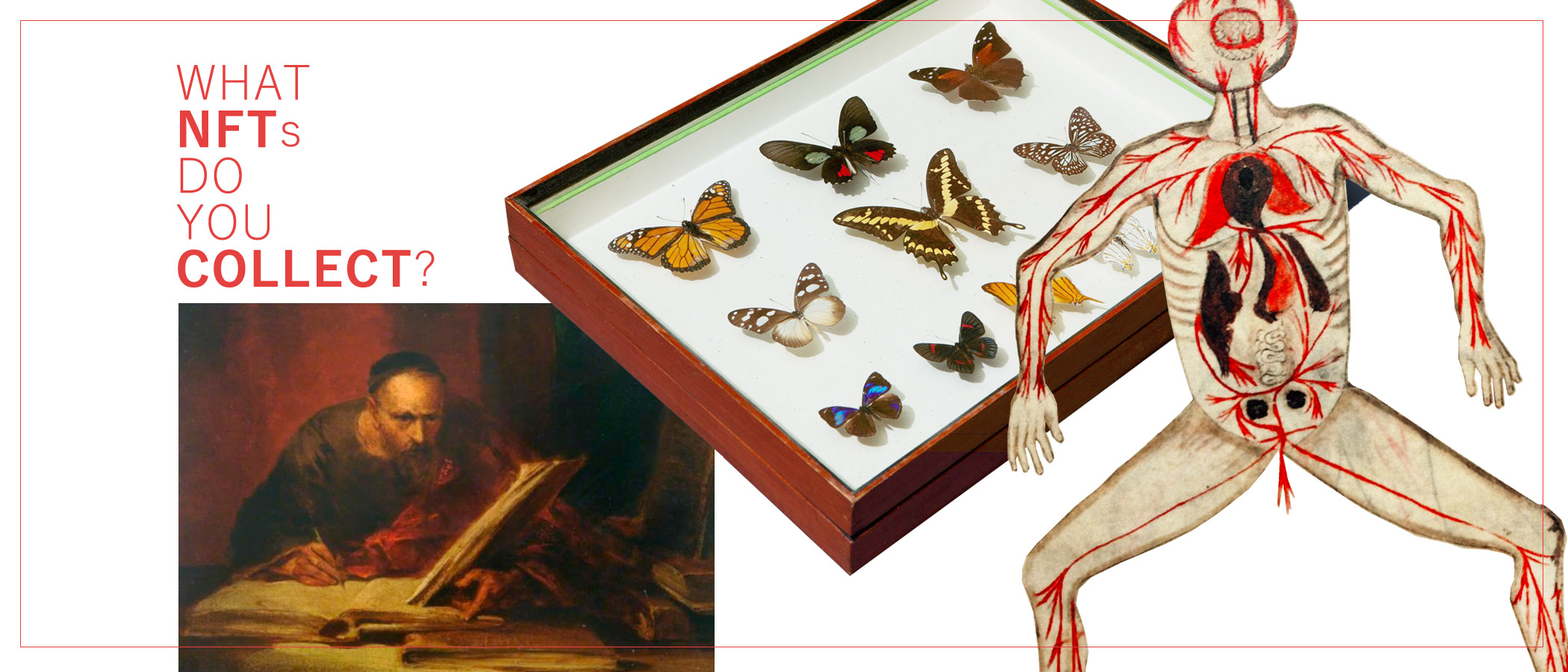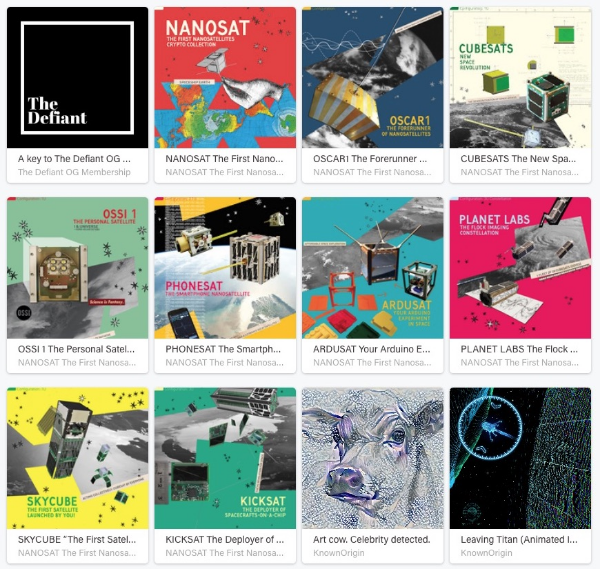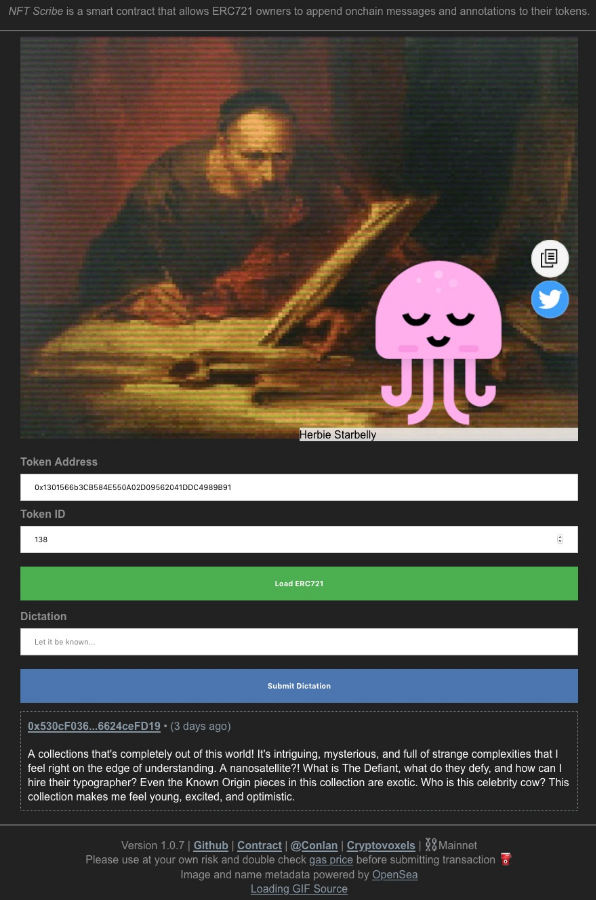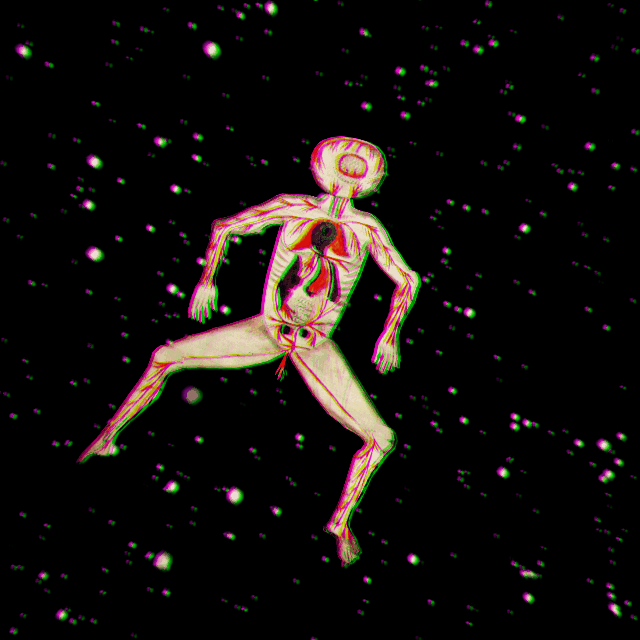
What NFTs do you collect?
January 29, 2020 · Nanosat Team
Dan is an engineer at OpenSea, the world's largest digital marketplace for crypto collectibles and non-fungible tokens (NFT's). He is situated in an authentic look-out that overviews on Ethereum-based digital collectibles. As explains The NFT Bible: Everything you need to know about nonfungible tokens written by Devin Finzer, “As a marketplace for NFTs, OpenSea has a unique vantage point: we’ve seen nearly every NFT-related project that has come online since late 2017 when the first NFT standard emerged.”
With this background, Dan tweeted:
In fact, it was a way to ask "what NFTs do you collect?," and then visit, comment and enrich the collection with a NFT gift that includes their compliment.
A collection that's completely out of this world!
We, as bold as brass, posted our address. And this is a view of the collection which, above all, has NANOSAT NFTs; that's because between October and December 2019, we have tested NFT as 'digital trading card' by minting a prototype version of NANOSAT, The First Nanosatellites Crypto Collection.

This was the compliment of Dan annotated with NFT Scribe by @conlan: “A collections that's completely out of this world! It's intriguing, mysterious, and full of strange complexities that I feel right on the edge of understanding. A nanosatellite?! What is The Defiant, what do they defy, and how can I hire their typographer? Even the Known Origin pieces in this collection are exotic. Who is this celebrity cow? This collection makes me feel young, excited, and optimistic.”

Are we preserving us by collecting NFT's?
At this point, my friend and associate, who read the draft of this post, raises tricky questions in this crypto unexplored territory: What is a NFT collector? What are "the passions of the collector"? Are we preserving us by collecting NFT's?
This questions reformulates Benjamin's approach about the collectors and collections of books. Walter Benjamin wrote an essay, in 1931, entitled "Unpacking My Library: A Talk about Book Collecting." There we find these deep and bright reflections: “We collect books in the belief that we are preserving them when in fact it is the books that preserve their collector (...) Ownership is the most intimate relationship that one can have to objects. Not that they come alive in him; it is he who lives in them.”
And precisely the ownership is the alpha and omega of the NFTs! Returning to the NFT Bible, we find these illuminating definitions: “Non-fungible tokens (NFTs) are unique, digital items with blockchain-managed ownership. Examples include collectibles, game items, digital art, event tickets, domain names, and even ownership records for physical assets (...) Just as we had digital currencies (think airline points, in-game currencies) before cryptocurrencies emerged, we’ve had non-fungible digital assets since the dawn of the internet. Domain names, event tickets, in-game items, even handles on social networks like Twitter or Facebook, are all non-fungible digital assets; they just vary in their tradeability, liquidity, and interoperability (...) So it’s clear we already have tons of digital stuff. But to what extent do we “own” these digital things? If digital ownership only means that an item belongs to you and not someone else, then you own them in some sense. But if digital ownership is more like ownership in the physical world (the freedom to hold and transfer indefinitely), this doesn’t always seem to be the case with digital assets. Rather, you own these assets in specific contexts, which may or may not make moving them around easy. Try to sell a Fortnite skin on eBay, and you’ll discover the dificulty of moving digital assets from one person to another. This is where blockchains come in! Blockchains provide a coordination layer for digital assets, giving users ownership and management permission. Blockchains add several unique properties to non-fungible assets that change the user and developer relationships with these assets.”
What NFTs do you collect? And why do you collect it? The best three comments will be rewarded with original Ethereum NFTs if you include the address of your wallet.
.
.
.
This post was originally published on cent:
https://beta.cent.co/+of09dy
COMMENTS
Jan 29, 2020 by @magpie
With NFT artwork and ownership, its an interesting one. I don't fully subscribe to the view that you 'own' the art. You rather own the hash to which a digital artwork file is appended.
I don't think digital artwork particularity lends itself to 'ownership'. How can you own something that I can just copy and paste, and is therefore infinitely replicable?
The value of NFT's comes from the hash, which does prove that you are verified in some way as a holder of the artwork. However, you don't have any commercial or public display rights, which I believe rest with either the artist or maybe the platform displaying the artwork. So you can't enforce scarcity of consumption by requesting that the image appended to your hash be taken down, something that you can do with more traditional art (both digital and physical).
Saying all that, it's a very exciting new world, that has loads of potential, and I'm sure someone will soon enough program some more ownership rights into a smart contract to make a rathe ropaque situation clearer!
Jan 22, 2020 by @nanosat
With NFT artwork and ownership, its an interesting one. I don't fully subscribe to the view that you 'own' the art. You rather own the hash to which a digital artwork file is appended.
I don't think digital artwork particularity lends itself to 'ownership'. How can you own something that I can just copy and paste, and is therefore infinitely replicable?
The value of NFT's comes from the hash, which does prove that you are verified in some way as a holder of the artwork. However, you don't have any commercial or public display rights, which I believe rest with either the artist or maybe the platform displaying the artwork. So you can't enforce scarcity of consumption by requesting that the image appended to your hash be taken down, something that you can do with more traditional art (both digital and physical).
Saying all that, it's a very exciting new world, that has loads of potential, and I'm sure someone will soon enough program some more ownership rights into a smart contract to make a rathe ropaque situation clearer!
